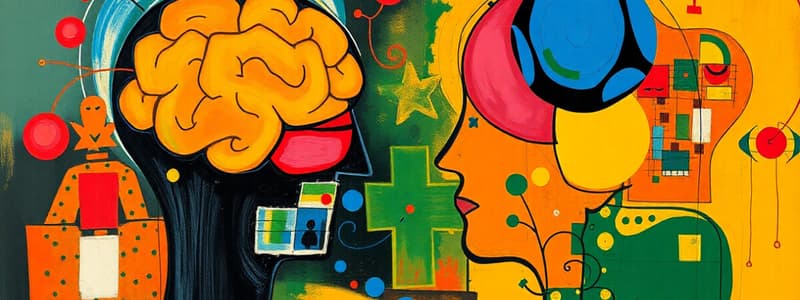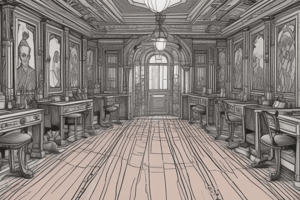Podcast
Questions and Answers
According to Kelly, what is the primary focus when trying to understand a person?
According to Kelly, what is the primary focus when trying to understand a person?
- Analyzing their past experiences.
- Understanding the environmental factors influencing their behavior.
- Predicting their behavior in a given environment.
- Knowing what alternative actions the person considered. (correct)
What does Kelly mean by "man-the-scientist"?
What does Kelly mean by "man-the-scientist"?
- The concept that all individuals create and test their own theories about the world. (correct)
- The idea that only scientists can truly understand human behavior.
- The approach of applying strict scientific methods to the study of psychology.
- The belief that men are more rational and scientific than women.
In Kelly's theory, what are constructs?
In Kelly's theory, what are constructs?
- Learned responses to environmental stimuli.
- Unconscious defense mechanisms.
- Mental representations used to interpret and predict the world. (correct)
- Innate behavioral patterns.
What is constructive alternativism?
What is constructive alternativism?
According to Kelly's fundamental postulate, what primarily directs a person's psychological processes?
According to Kelly's fundamental postulate, what primarily directs a person's psychological processes?
What does the Construction Corollary propose?
What does the Construction Corollary propose?
According to the Individuality Corollary, why do people interpret events differently?
According to the Individuality Corollary, why do people interpret events differently?
What does the Organization Corollary suggest about personal constructs?
What does the Organization Corollary suggest about personal constructs?
How does the Dichotomy Corollary describe the nature of constructs?
How does the Dichotomy Corollary describe the nature of constructs?
According to the Choice Corollary, how do people make choices between constructs?
According to the Choice Corollary, how do people make choices between constructs?
What does the Range Corollary state about constructs?
What does the Range Corollary state about constructs?
How does the Experience Corollary explain the evolution of personal constructs?
How does the Experience Corollary explain the evolution of personal constructs?
According to the Modulation Corollary, what limits the variation in a person’s construction system?
According to the Modulation Corollary, what limits the variation in a person’s construction system?
What is the key idea behind the Fragmentation Corollary?
What is the key idea behind the Fragmentation Corollary?
How does the Commonality Corollary explain shared experiences?
How does the Commonality Corollary explain shared experiences?
What does the Sociality Corollary emphasize about human interaction?
What does the Sociality Corollary emphasize about human interaction?
According to Kelly, what is threat?
According to Kelly, what is threat?
What is the primary difference between threat and fear, according to Kelly?
What is the primary difference between threat and fear, according to Kelly?
According to Kelly, how is hostility best defined?
According to Kelly, how is hostility best defined?
What is the correct sequence of the C-P-C Cycle?
What is the correct sequence of the C-P-C Cycle?
Flashcards
Personal Construct Theory
Personal Construct Theory
A theory that posits that individuals understand the world through unique frameworks of personal constructs, which influence their anticipation of events.
Constructive Alternativism
Constructive Alternativism
The idea that all of our present interpretations of the environment are open to revision or replacement; there are always alternative constructs that may help us deal with new or difficult situations.
Man-the-Scientist
Man-the-Scientist
Describes the idea that each individual acts as a scientist, developing theories and testing hypotheses to better understand and predict life events.
Constructs
Constructs
Signup and view all the flashcards
Fundamental Postulate
Fundamental Postulate
Signup and view all the flashcards
Construction Corollary
Construction Corollary
Signup and view all the flashcards
Individuality Corollary
Individuality Corollary
Signup and view all the flashcards
Organization Corollary
Organization Corollary
Signup and view all the flashcards
Dichotomy Corollary
Dichotomy Corollary
Signup and view all the flashcards
Choice Corollary
Choice Corollary
Signup and view all the flashcards
Range Corollary
Range Corollary
Signup and view all the flashcards
Experience Corollary
Experience Corollary
Signup and view all the flashcards
Modulation Corollary
Modulation Corollary
Signup and view all the flashcards
Fragmentation Corollary
Fragmentation Corollary
Signup and view all the flashcards
Commonality Corollary
Commonality Corollary
Signup and view all the flashcards
Sociality Corollary
Sociality Corollary
Signup and view all the flashcards
Threat
Threat
Signup and view all the flashcards
Fear
Fear
Signup and view all the flashcards
Guilt
Guilt
Signup and view all the flashcards
Anxiety
Anxiety
Signup and view all the flashcards
Study Notes
- Kelly's personal construct theory prioritizes cognitive constructs, differing from cognitive social learning's focus on environmental factors in behavior.
- Kelly's theory emphasizes understanding what a person might have done, not just predicting actions.
- Kelly's personal construct theory was detailed in his 1955 two-volume work and later expanded by Brendan Maher in 1969.
Constructive Alternativism
- Kelly suggests that everyone theorizes and tests their life circumstances, similar to psychologists studying behavior.
- Kelly uses the term "man-the-scientist" to explain how all people approach and understand the world around them
- Representations of the environment are constructs.
- Constructs are patterns to fit over the realities of the world, continuously modified and tested for predictive ability.
- Constructive alternativism: present interpretations are open to revision with alternative constructs evaluated for predictive efficiency.
- Individuals test constructs to predict and control their lives.
Basic Theory of Personal Constructs
- The fundamental postulate of the personal construct theory states that a person’s processes are psychologically channelized by the ways in which they anticipate events.
- The fundamental postulate emphasizes individuality, constant mental motion, psychological pathways, anticipation, and real-life events.
Construction Corollary
- People anticipate events by interpreting replications, construing what new events will be like based on past similarities and differences.
- Construing is placing an interpretation upon an event.
- This process is largely preverbal and automatic.
Individuality Corollary
- People differ in their construction of events due to their unique roles and subjective interpretations, even when sharing similar experiences.
Organization Corollary
- People develop constructs systematically, ranking them with some preferred over others (e.g., intelligent constructs over stupid ones).
- Contradictory constructs may exist, and people will usually prefer the better construct.
Dichotomy Corollary
- Every construct has positive and negative aspects.
Choice Corollary
- People choose the alternative in a dichotomized construct that best extends and defines their system, even if the best choice is not obvious.
Range Corollary
- Each construct has a limited range or focus, and may not apply to all events.
Experience Corollary
- People reconstruct their constructs and learn from unexpected outcomes, as man-the-scientist is always a work in progress.
Modulation Corollary
- The ease of modifying constructs varies among individuals, emphasizing the difference between psychological processes and scientific processes.
- People constantly test and reconstruct constructs to facilitate their own lives, unlike scientific theories meant to apply universally.
Fragmentation Corollary
- People may use incompatible construction subsystems, especially when resisting change or in the process of changing constructs.
- Dramatic behavior changes are reasonable progressions in the desire for predictability and control.
Commonality Corollary
- Similar psychological processes occur when people employ similar constructions of experience, facilitating shared experiences.
- Unlike behavioral perspectives, the cognitive perspective emphasizes that each person experiences events uniquely.
Sociality Corollary
- The ability to predict and control life is based on predicting others, making it important to construe others' thoughts and behaviors to play a role in their lives.
Dimensions of Transition
- Problems arise when individuals cannot transition from ineffective to effective constructs.
- Threat: awareness of imminent comprehensive change in core structures.
- Fear: awareness of a new incidental construct emerging.
- Guilt: perception of dislodgment from one's core role structure.
- Anxiety: recognition that events lie outside the range of one's construct system.
- Aggressiveness: actively elaborating one's perceptual field.
- Hostility: continued effort to extort validational evidence for a failed social prediction.
C-P-C Cycle
- A cycle of transition involving circumspection, preemption, and control.
- Circumspect: Being wary and precise in construct development.
- Preempt: Exclusive membership in a realm that fits what individuals try to predict and control.
- Choice is a natural consequence.
Creativity Cycle
- A cycle that begins with loose constructions and leads to tightened, validated constructions.
- Individuals experiment with various constructs and seize upon the most promising, tightening and testing it.
- Creativity requires beginning with loose constructions because tight constructions may limit productivity.
- Creativity is essential for well-being and healthy psychological development.
Studying That Suits You
Use AI to generate personalized quizzes and flashcards to suit your learning preferences.




